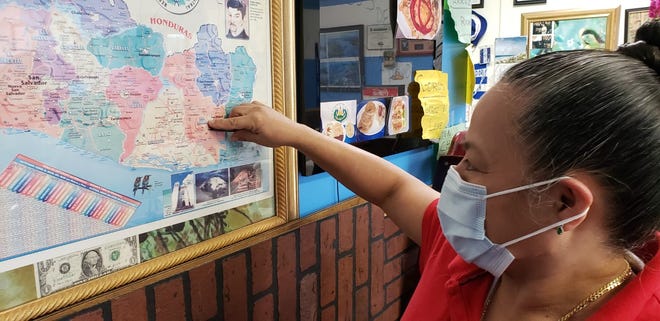Fayetteville much more than just chain restaurants

We were pretty meat-and-potatoes in my family, growing up.
To be specific, you’d call my mom’s meals “soul food” were they to be served up in a restaurant — lots of bird (chicken, turkey), ham, collards and turnip greens, mashed potatoes, okra, sweet potatoes, cornbread, peas and green beans, cabbage, mac and cheese — you get the picture. As a kid, I took this Sunday afternoon, after-church smorgasbord for granted. I did not appreciate until later how good the food actually was.
Several years ago, I asked my dad if he thought Ma’s cooking was at last equal to the legendary cooking of Ma’Dear — his mom — and without hesitation, he said it was. This counts as a stunning admission and high praise in Southern families.
My mom is from rural Georgia, round about Atlanta, and my dad is from Valdosta, near the Georgia-Florida line. My father has never had much truck with what once would have been called “ethnic” restaurants. Even pizza is a bridge too far for him, and my mom would get it for her three sons only those times when he was working or otherwise not at home.
More:‘A little international food court’: Eating around the world at a Fayetteville strip mall
By contrast, I will try food from anywhere — and I am rarely disappointed. I moved away for several years, living in the D.C. metro area for part of that time. When I returned to Fayetteville, I discovered we have a wide range of dining options that go way beyond the familiar chain restaurants.
It is a consistently surprising aspect of this city that many from outside don’t know about, at least until they get here.
That is one reason my colleague Jacob Pucci, who covers food, drinks, restaurants and business, will this week take a detailed look at the dining scene in Fayetteville — where it came from and where it’s going.
The series will look at:
• Fayetteville’s earliest restaurants and how the city’s food culture was built — from barbecue to soul food to several locally famous lunch spots and diners.
• The quest for fine dining in a city whose cuisine is typically defined by national chains.
• Seven ways Fayetteville can level up its dining scene, from more vegan options to better breakfast pastries.
More:Neighborhood guide: Where to eat on Murchison Road, from bratwursts to fried gizzards
And for people who can’t talk enough about food, Pucci hosts the popular Fayetteville Foodies, an Observer Facebook group.
Diverse dining
Fayetteville’s strong connection to different cultural cuisines, despite the city otherwise being enthralled by chain restaurants, makes lots of sense. Military folks travel, are deployed and sometimes are stationed abroad. They bring back home their tastes for cuisine from elsewhere. But also, I think the city is being swept up in a larger trend of eclectic dining, especially in urban and suburban areas.
In our city’s past, it was lots of Asian restaurants — who remembers the old Canton Station on McPherson Church Road? In 1989, I took my prom night date to dinner at the Kyoto Japanese steakhouse on Yadkin Road.

In the last quarter-century or so, I have seen a big infusion of restaurants spanning other cultures, from Indian to Cuban to West African to Central American to Mediterranean, joining the well-established Asian and Mexican establishments already located here. We are obviously the better for it.
El Salvador Restaurant is a favorite of mine — with a menu that my wife, myself and our two children can all agree on. That doesn’t always happen. But the Pitts fam can put a hurtin’ on a plate of pupusas — they are flat corn tortillas stuffed with things like cheese and beans, pork cracklings or loroco, an edible flower.
The small restaurant is located on Bonanza Drive, at the Morganton Road intersection. It is part of a plaza anchored by Compare Foods, a supermarket that caters heavily to the Latino community.

I talked to the owner Maria Salgado; her personal bio symbolizes the evolution (or revolution?) we are seeing in diverse menu options around here.
She started off when she got to Fayetteville in 1991 as a dishwasher. She would later work buffets and wait tables. Canton Station, which is now closed, was one of her early jobs, she says.
Salgado’s story is partly an immigrant story — reminiscent of the generation of restaurateurs from Greece who founded some of Fayetteville’s most well-known restaurants and whose lives and dreams so intertwine with the city’s restaurant scene.
Except Salgado’s tale is one of Central America.
A taste of home
Maria Salgado was one of nine children in a farm family — they raised cows and chickens and grew crops like corn and beans in the department, i.e., state, of San Miguel in eastern El Salvador.
“Not a big farm,” she makes clear. “A little farm.”
She tells me she and her siblings slept two to three to a bed.
I asked her: “Did you say two to three in a room?”
She chuckled. No, a bed, she said. There were just two rooms.
Salgado learned to cook at the elbow of her mother, who was also named Maria, and her auntie, Marinela. Marinela lives in California, the older Maria still lives in El Salvador.
“My mom has a nice house now,” Salgado says with a smile.
I asked what were her favorite dishes growing up and did they ever go out to eat. These questions also elicited chuckles.
“We had not much choice,” she said. “We ate rice and beans and eggs while we were growing up.”
But she thinks how she learned to cook has contributed to her restaurant’s success, which she opened in 2006, when she was just 26.
“We cook typical,” she says, “like at home.”
I believe it. I think of the hearty Salvadoran food she serves as a different version of meat-and-potatoes.
Salgado says the military presence is key for her business, too. The Fort Bragg gates are just a few miles from her restaurant.
She says the restaurant has had two extremely tough financial periods — the recession of 2008, which was two years after she opened, and the COVID-19 pandemic, which she says was much, much worse.

During the pandemic, she realized she could not simply stay closed. She offered takeout, which kept a connection to her loyal customers.
Business is pretty good now, she says. But like other employers, she has had staffing difficulties. Some applicants have asked for hourly wages from $15 to $20, which she says she cannot pay.
“I’m still here,” Salgado says with a determined smile. “It’s been hard times, but I’m still here.”
More:50 eateries to try in Fayetteville
For, me, there is “full circle” context to El Salvador Restaurant. The Compare supermarket plaza is located right across Bonanza Drive from where I went to elementary school, and down from the Westover schools where I also attended.
There used to be just woods there. We would tramp through them to go get candy at a convenience store in a strip mall on Morganton Road.
The restaurant is probably two minutes from my parents’ house.
Maybe I should take my dad some pupusas. What do you think?
Opinion Editor Myron B. Pitts can be reached at [email protected] 910-486-3559.
Support local journalism with a subscription to The Fayetteville Observer. Click the “subscribe” link at the top of this article.








